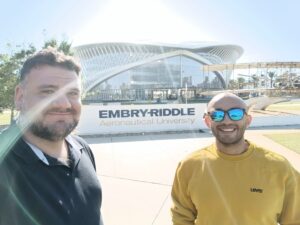Spain
Innovators/Entrepreneurs
Date of the expedition
From 15/08/2023 to 15/02/2024
Selected Track
Open Ideas
Project title
AI for onboarding for SMEs
Host Organization
University of Maryland, Baltimore County
Media

Biography
Fernando Gomez, an accomplished HR Management professional with over 12 years in the field, propels TrainingExperience.org into the future. As a distinguished contributor to NGI Explorers, Fernando played an R&D manager role in the Evolutive CV project based in Blockchain, showcasing his commitment to innovation. TrainingExperience.org, conceived by Fernando, revolutionizes SME onboarding. Embracing a human-centric approach, the platform utilizes AI to craft personalized learning experiences, adapting to individual CVs and prior experiences.
Project Summary
Title: AI for Onboarding Process in SME
Purpose:
The purpose of our project is to revolutionize the onboarding process for Small and Medium Enterprises (SMEs) by introducing an AI-powered solution. This initiative aims to provide personalized, adaptive training experiences for new hires, enhancing efficiency, user experience, and overall effectiveness in skill acquisition. Whether the individual is a journalist learning WordPress or a digital marketer mastering SEO plugins, our platform tailors the onboarding journey based on each person’s unique background and expertise.
Challenge and Significance:
The challenge addressed by our project is the traditional, often time-consuming onboarding methods that lack personalization and can be inefficient for both employees and organizations. The significance lies in leveraging AI to go beyond generic training materials. By considering individual knowledge and experiences, our solution optimizes the onboarding process, saving time, increasing engagement, and ultimately contributing to the success and productivity of SMEs. This project aligns with the evolving needs of modern workplaces, where customization and efficiency are paramount for sustainable growth.
Furthermore, the project addresses the challenge of adapting to diverse roles within SMEs. Traditional onboarding struggles to cater to the specific needs of individuals with varied skill sets. Our AI solution responds to this challenge by dynamically adjusting the learning process based on the unique requirements of different roles, ensuring relevance and effectiveness.
The purpose of this project stems from the recognition that SMEs play a vital role in the economy, and their success often hinges on the efficient integration of new team members. By introducing an innovative onboarding solution, we aim to empower SMEs with a tool that not only enhances the initial training experience but also contributes to long-term employee satisfaction, retention, and overall organizational success.
In summary, the project’s purpose is to address the limitations of traditional onboarding in SMEs by introducing a groundbreaking AI solution that personalizes and streamlines the training process.
Key Result
- Efficiency Improvement Objective: As the platform advances towards completion and testing, the goal is to achieve a measurable reduction in onboarding time compared to traditional methods, enhancing operational efficiency. Target: 20% reduction in onboarding duration upon implementation.
- User Experience Enhancement Objective: The aim is to attain a high level of user satisfaction with the onboarding process. This will be measured through feedback and engagement metrics, with a target of a 90% user satisfaction rate.
- Cost Savings Objective: Post the platform’s completion, the objective is to demonstrate tangible cost savings for SMEs by reducing expenses associated with traditional onboarding, such as training materials and resources. Target: 15% reduction in onboarding costs.
- Personalization Impact Objective: The intention is to measure the impact of personalization on learning outcomes by evaluating the proficiency and confidence levels of employees post-onboarding. Target: 25% improvement in proficiency assessments.
- Adoption Rate Objective: Post the successful completion and testing, the target is to achieve a high adoption rate among SMEs. The goal is to onboard at least 10 SMEs within the first six months of full implementation.
- Retention Improvement Objective: The plan is to evaluate the impact of the AI onboarding solution on employee retention rates within the first year of employment. Target: 10% improvement in employee retention.
- Adaptability and Customization Objective: The intention is to showcase the platform’s adaptability to different roles within SMEs. The target is to demonstrate successful implementation in at least three distinct job roles, highlighting its versatility and customization capabilities.
These key results align with the project’s objectives, establishing measurable indicators of success. However, it’s important to note that we are currently in the programming and testing phase, and tangible results are pending as we advance through this stage. While we are optimistic about the potential benefits the AI for Onboarding Process in SME can deliver to organizations and employees, specific outcomes will be determined as we progress further in the development process.
Impact of the Fellowship
Currently, we’ve made significant strides in developing a crucial aspect of our AI, allowing us to comprehend and analyze a company’s onboarding system. We can effectively compare this with the CV of a new employee, streamlining the initial stages of our project. Our ongoing focus lies in enhancing the AI’s understanding of soft skills, ensuring a more nuanced adaptation.
The NGI Enrichers Transatlantic Fellowship has been instrumental in advancing our capabilities. Collaboration with esteemed departments led by Dr. Song and Dr. Yongxin at our host institution has provided valuable insights and synergies, strengthening the research backbone of our project.
Engaging with companies and startups in the USA during the fellowship has been invaluable. This exposure has deepened our understanding of the intricacies of onboarding systems in the USA, allowing us to align our solutions more closely with market needs.
In the near future, we are gearing up to introduce a product that will undergo testing in the dynamic USA markets. This represents a pivotal moment as we transition from developmental phases to practical application.
As we approach the product readiness stage, our attention turns to investors. Securing support and resources will be crucial for scaling our project, and the fellowship opens avenues for accelerated contacts with potential investors.
Equally vital is our commitment to collaboration. Post-product readiness, we aim to expand collaborations within the NGI community and universities. Sharing our project with these entities not only enriches the broader ecosystem but also opens avenues for potential partnerships and further advancements in the field.
In summary, the NGI Enrichers Transatlantic Fellowship has significantly propelled our project, enabling key collaborations, insights into the US market, and advancements in our AI capabilities. As we gear up for testing and market entry, we’re poised for a transformative journey towards reshaping onboarding processes.

